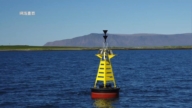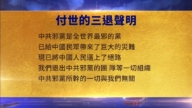【新唐人2014年04月15日讯】甘肃省兰州市自来水“苯”含量严重超标事故,爆发至今已有5天,然而,有关水污染的真正原因,兰州官方的说法一改再改,民众莫衷一是。而针对市政府宣称,自来水已恢复正常,仍有不少民众质疑,不敢贸然饮用。
10号下午5点,兰州市唯一的一家水厂——兰州威立雅水务集团公司,测出出厂的水“苯”含量高达每升118微克,到11号凌晨2点,已增为每升200微克,是国家规定的安全标准 ——每升10微克的20倍。
13号,兰州市政府表示,兰州“威立雅水务集团”公司的自流沟周边有大量的地下含油污水,是这次自来水“苯”超标的直接原因。
《每日经济新闻》引述环境应急专家组成员王金生的话表示,兰州自来水中的“苯”,来源于“中国石油兰州石化公司”上世纪80年代发生泄漏事故后,渗入到地下的污染物。自流沟到寿后,收缩缝老化,滞留区的含“苯”地下水,通过收缩缝进入自流沟,进而污染到水质。
不过,兰州环保局长闫子江对媒体说,“中石油”兰州分公司一条管道发生原油泄漏,污染了供水企业的自流沟,导致兰州自来水“苯”超标。
而《人民日报》则指出,经甘肃省环保厅环境监测站监测,兰州自来水“苯”超标主要原因,是水厂泵房实施清洗作业所致。
另外,《中国经营报》报导说,自流沟附近有很多的化工企业,“苯超标”是这些化工企业肆意排污造成的。
甘肃省兰州市饭馆店员:“我们光看新闻,一会儿说这,一会儿说那,我们也不知道(污染源),老百姓能知道啥,这得你们媒体去挖掘真正的原因,不管什么污染,受害的还是老百姓,其实政府部门应该跟老百姓说清楚,到底是什么污染。”
13号下午1点,检测数据显示,兰州“威立雅自来水厂”1号泵房“苯”含量,已降到每升2.74微克,2号泵房“苯”含量也只剩每升1.72微克,不过,在发生“苯”污染的兰州西固区,仍随处可见排着长队取水的民众和一些歇业的饭店。
据了解,此次检测出“苯”超标的自流沟,位于“兰州石化”厂区附近,建成投用至今已近60年,承担着全市90%生活饮用水的输送任务。
饭馆店员:“影响就是,吃饭的人少了呗,现在水不是可以用了吗,我们也是听人家说可以用了,反正现在我们就吃了,中没中毒﹖我们也不知道。这人家不是都说是慢性毒药,对人身体致癌,这都知道!新闻上都说着呢,微信上都传着那个!”
针对自来水“苯”含量,在短短几天内大幅下降,“重庆食品工业研究所”副所长周令国指出,消除“苯”含量要靠水体的自然流动。
重庆食品工业研究所副所长周令国:“那就看那个水是流动的,还是死水,流动不大,它怎么排出啊,流水可以稀释,把它稀释了,把它冲击走。水自己不能排出苯。它是个化学物质,生物一吃掉它,要毒死的。”
北京水污染民间水专家张峻峰,则提出几个导致苯大幅下降的可能原因。
北京民间水专家张峻峰:“肯定它的取水口转变了,或者水的来源,比如污染体,给停止排放了,有这样的新闻之后,他害怕,也有可能是某一些人,个别的,把一些苯的东西倒入了水里面,就造成了污染。它不可能是长期性的,长期性的早就发现了。它一定是一个临时性的,像这个突发事件,要嘛是工厂泄漏,一种是人为的倾倒。”
10号下午5点,“威立雅公司”就发现自来水有“苯”超标现象,不过,兰州市政府直到11号上午11点,才发布自来水不宜饮用通告,足足延迟了18个小时,引发民众质疑。事实上,上个月10号,就有市民向当局反映水有异味,结果被当局以“网路造谣”刑拘。
据了解,中石油管道之前多次发生“渗油现象”,早在2011年5月,上海《东方早报》就曾深入报导兰州地下油污管道超期服役,存在安全隐患的问题。
采访/朱智善 编辑/陈洁 后制/陈建铭
Lanzhou Drinking Water Polluted with Excessive Benzene
For five days, excessive benzene has been detected in Lanzhou’s
drinking water.
However, officials have not given a confirmed explanation
for the pollution.
People hesitate to use the water even though the official claims
the water is clear of all pollutant.
At 17:00 on March 10, Lanzhou water plant of Lanzhou
Veolia Water Company,
found 118 micrograms of benzene per liter of water and 200
micrograms per liter at 2:00 on March 11.
This makes it 20 times the national safety standard,
with 10 micrograms of benzene per liter of water.
Lanzhou municipal government said, the benzene came
from oily wastewater.
According to Wang Jinsheng, local environment task force
member, Lanzhou Petrochemical Co is to blame for the pollution.
The oil leak in the 80s seeped into the ground and has re-emerged
as the aging of retention to the area, polluting the water sources.
However, Lanzhou environmental protection bureau
Yan Zijiang said,
that the oil has leaked through a pipeline of Lanzhou
Petrochemical Co,
contaminating the water supply with
excessive benzene.
The People’s Daily reported that Gansu Provincial Environmental
Protection Bureau,
has identified the water plant pump room cleaning operation,
resulted in the contamination of the water supply.
In addition, China Business said the arbitrary discharges from
chemical companies surrounding the gravity flow
channels, are the cause of excessive benzene.
A Lanzhou restaurant clerk: “We don’t know the exact cause of
the pollution. The media needs to find out for us.
We are the victims. The government should explain to us."
At 13:00 of April 13, benzene levels at Lanzhou Veolia Water Plant
at pumping station one,
had dropped to 2.74 micrograms per liter, and 1.72 micrograms
per liter at pumping station two.
However, local residents are still lining up to pick up water.
Restaurants are also closed due to the water problem.
It is said that the gravity flow channel with excessive benzene is
located near the Lanzhou Petrochemical plant.
This particular channel has supported 90 percent of all drinking water
in Lanzhou for nearly 60 years.
Restaurant clerk: “It affects business, a lot less people will
come to the restaurant.
Now we just use the water no matter if it is poisonous or not,
the government said it is ok.
According to a news report and WeChat, It was said there is a chronic
and cancer causing poison in the water."
Regarding the significant drop of benzene levels in the
last few days,
Chongqing Institute of Food Industry deputy director
Zhou Lingguo pointed out,
benzene elimination depends on the
water’s natural flow.
Zhou Lingguo, Chongqing Institute of Food Industry deputy
director: “The flowing water can dilute it, but the
near static water can not.
The water itself can’t discharge it.
It is a chemical which kills."
Beijing water pollution expert Zhang Junfeng explains some
possible reasons for the sharpl decrease in benzene levels.
Zhang Junfeng, Beijing water pollution expert: “Surely they
have changed the water source or stopped using the polluted sources.
Maybe someone has poured the pollutants in to the water recently.
I don’t think its been there long very long;
otherwise it would have been found long ago.
It’s just temporary or an incident resulting from a plant leak
or personal dumping."
Veolia water company found excessive benzene in the water
At 17:00 of April 10.
However, Lanzhou municipal government did not issue the
warning of not to use the water until 11:00 am of April 11.
That was a delay of 18 hours.
People questioned a smell in the water was reported
on March 10.
The authorities did nothing but arrest the person who complained
about the smell on charges of ‘Internet rumors’.
It is said there were many oil leaks in the Petrochemical
oil pipelines.
On May 2011, Shanghai Oriental Morning Post, reported
about hidden risks of the aged Lanzhou underground oil pipelines.
Interview/Zhu Zhishan Edit/ChenJie Post-Production/Chen Jianming




























